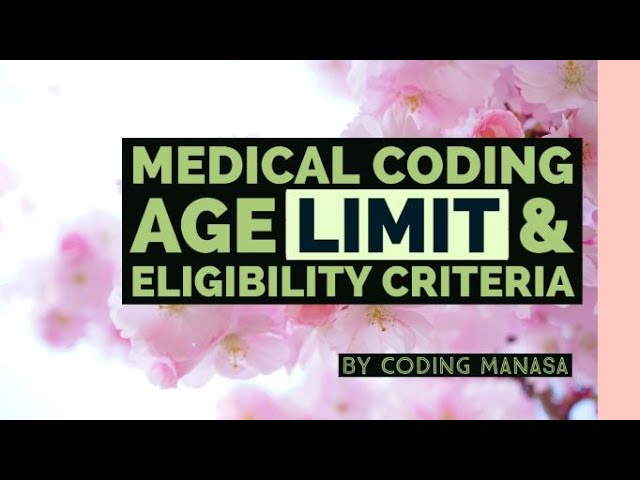Medical coding is a thriving field that plays a crucial role in healthcare operations. However, many individuals ponder upon a common question: Is there any age limitation for entering this profession? In this article, we will explore the reality behind age barriers in medical coding, shedding light on the opportunities that await individuals regardless of their age. Whether you are considering a career change or simply curious about the possibilities, join us as we debunk any misconceptions and uncover the truth about age restrictions in the world of medical coding.
Benefits of a Career in Medical Coding

This image is property of i.ytimg.com.
Good job prospects
A career in medical coding offers excellent job prospects. The healthcare industry continues to grow, and the need for skilled medical coders is constantly increasing. With the implementation of electronic health records (EHRs) and the transition from ICD-9 to ICD-10 coding systems, the demand for qualified medical coders has soared. This high demand translates into a wide range of employment opportunities and job security for those in the field.
Flexible work hours
One of the advantages of a career in medical coding is the flexibility it offers. Many medical coders have the option to work remotely or on a flexible schedule. This is particularly beneficial for individuals who need to balance work with other responsibilities, such as raising a family or pursuing further education. The ability to have control over your work hours can greatly improve work-life balance and overall job satisfaction.
Potential for growth and advancement
medical coding is a profession that offers numerous opportunities for growth and advancement. Starting as an entry-level coder, you have the chance to progress and move up the career ladder. With experience and additional certifications, you may qualify for supervisory or management roles within the coding department or even transition to other areas of healthcare administration. The field of medical coding is constantly evolving, and those who are willing to invest in their professional development can reap the rewards of advancement and a fulfilling career.
Education and Training Requirements for Medical Coding

Obtaining the necessary certifications
To pursue a career in medical coding, it is essential to obtain the necessary certifications. The most common certification is the Certified Professional Coder (CPC) credential, which is offered by the American Academy of Professional Coders (AAPC). Other certifications, such as the Certified Coding Associate (CCA) or the Certified Coding Specialist (CCS), are also recognized in the industry. These certifications demonstrate your competence and knowledge in medical coding, and are highly valued by employers.
Continuing education requirements
Medical coding is a profession that requires continuous learning and staying up-to-date with industry changes. As technology advances and coding systems evolve, it is important for medical coders to invest in continuing education. This can be done through attending conferences, webinars, or taking specialized courses in areas such as ICD-10 coding or EHR implementation. continuing education not only helps you stay current with industry trends, but it also enhances your skills and improves your marketability as a medical coder.
Skills and knowledge needed
In addition to the required certifications, Medical coders need to have a specific set of skills and knowledge to excel in their roles. Attention to detail is crucial, as even a minor error in coding can have significant implications for patient care and reimbursement. Strong analytical and problem-solving skills are also essential, as medical coders often need to interpret complex medical documentation and assign the appropriate codes. Effective communication and teamwork skills are important for collaborating with healthcare providers and other coding professionals. Additionally, a solid understanding of medical terminology, anatomy, and physiology is necessary to accurately assign codes.
Age Restrictions in Medical Coding

This image is property of i.ytimg.com.
No specific age requirement
Unlike some professions that may have age restrictions, there is no specific age requirement for entering the field of medical coding. Medical coding is open to individuals of all ages, as long as they meet the necessary education and certification requirements. This inclusivity provides opportunities for individuals from different age groups to pursue a career in medical coding and contribute to the healthcare industry.
Equal opportunities for all ages
Regardless of your age, the field of medical coding offers equal opportunities for everyone. The demand for skilled medical coders is significant, and employers are more concerned with qualifications and experience rather than the age of the candidate. Older individuals who are considering a career in medical coding should not be discouraged, as their experience and expertise can be valuable assets in the profession.
Experience and qualifications matter more than age
In medical coding, experience and qualifications matter more than age. Employers prioritize candidates with relevant certifications and a proven track record of successful coding. While older individuals may have less experience with technology or recent coding systems, their extensive life and work experience can compensate for this. In fact, their maturity, strong work ethic, and professionalism can be advantageous in handling the challenges and responsibilities of medical coding.
Challenges Faced by Older Individuals

Adapting to new technologies and systems
One of the challenges that older individuals may face in medical coding is adapting to new technologies and systems. The healthcare industry is constantly evolving, and new software programs and coding systems are introduced regularly. Older individuals who have less exposure to technology may find it initially challenging to learn and navigate these new systems. However, with proper training and a willingness to embrace technology, these challenges can be overcome.
Keeping up with industry changes
Another challenge for older individuals in medical coding is keeping up with industry changes. As mentioned earlier, the field of medical coding is continually evolving. New coding guidelines, regulations, and updates are released regularly, requiring medical coders to stay informed and up-to-date. Older individuals may find it more difficult to adapt to these changes compared to younger colleagues. However, with dedication to continuous learning and ongoing professional development, staying current with industry changes is achievable.
Overcoming age biases
Unfortunately, age biases can exist in any profession, including medical coding. Older individuals may face unfair assumptions or stereotypes about their ability to adapt to new technologies or keep pace with industry changes. Overcoming these biases requires demonstrating competence, staying current with industry trends, and showcasing the value of their experience and skills. By consistently delivering accurate and efficient coding, older individuals can break through these biases and thrive in their careers.
Advantages of Older Individuals in Medical Coding

This image is property of i.ytimg.com.
Extensive life and work experience
One of the advantages that older individuals bring to a career in medical coding is their extensive life and work experience. This experience can provide a deeper understanding and empathy for patients, as well as a broader perspective on healthcare systems and processes. Older individuals may have encountered a wide range of medical conditions and treatment plans, which can enhance their ability to assign accurate codes. Their wealth of experience can also contribute to more efficient and effective coding practices.
Strong work ethic and professionalism
Older individuals often possess a strong work ethic and professionalism that comes from years of experience in the workforce. They understand the importance of reliability, punctuality, and maintaining high standards of quality in their work. These attributes are highly valued in medical coding, as accuracy and attention to detail are paramount. Older individuals can serve as mentors and role models for younger colleagues, inspiring professionalism and setting a high standard of work ethic.
Ability to handle high-pressure situations
The ability to handle high-pressure situations is another advantage that older individuals bring to medical coding. With their experience, they have likely encountered challenging scenarios and have developed the resilience and composure necessary to handle them. medical coding often involves tight deadlines, complex cases, and the need for swift decision-making. Older individuals’ ability to remain calm and focused under pressure can contribute to the accurate and efficient completion of coding tasks.
Employment Opportunities for Older Individuals

Demand for experienced medical coders
The demand for experienced medical coders is significant, making it an opportune time for older individuals to enter or continue their career in the field. Employers value the expertise and knowledge that come with years of experience. Older individuals with a proven track record in medical coding can find ample employment opportunities in a variety of healthcare settings, such as hospitals, clinics, insurance companies, and consulting firms.
Opportunities in consulting and freelancing
For older individuals seeking more flexibility or autonomy in their work, there are opportunities in consulting and freelancing. Consulting firms often seek experienced medical coders to provide expert advice and guidance to healthcare organizations. Freelancing allows older individuals to choose their own projects and work on a contract basis. These options provide the freedom to work on a schedule that suits their needs and preferences, while still utilizing their valuable coding skills.
Specialized roles and continued learning
Another avenue for employment for older individuals in medical coding is through specialized roles and continued learning. As medical coding becomes increasingly complex and specialized, there is a demand for coders with expertise in specific areas, such as cardiology, oncology, or orthopedics. Older individuals who have developed specialized knowledge throughout their careers can leverage this expertise to secure employment opportunities in these specialized roles. Continued learning and staying current with industry trends are crucial for positioning oneself for these specialized opportunities.
Important Skills for Medical Coders

Attention to detail
Attention to detail is an essential skill for medical coders. Coding requires precision and accuracy in assigning the appropriate codes based on the information documented in patients’ medical records. Even a minor error can have significant consequences, leading to claim denials or incorrect billing. Medical coders must have a keen eye for detail and the ability to carefully review and analyze medical documentation to ensure accurate coding.
Analytical and problem-solving skills
medical coding involves analyzing complex medical documentation and applying the appropriate codes. Therefore, strong analytical and problem-solving skills are crucial for success in this field. Coders must be able to interpret medical terms, diagnoses, and procedures and determine the correct codes that accurately describe the services provided. The ability to think critically and solve coding challenges is essential for optimal coding accuracy.
Communication and teamwork
Effective communication and teamwork skills are important for medical coders. They often collaborate with healthcare providers, nurses, and other coding professionals to ensure accurate coding and documentation. Coders may need to seek clarification on medical documentation or provide additional information to healthcare providers. Clear and concise communication is key to maintaining a collaborative and efficient workflow within the coding department and across the healthcare organization.
Career Path in Medical Coding

Starting as an entry-level coder
The career path in medical coding usually starts with entry-level positions. Newly certified coders often begin their careers as coding specialists or coding assistants, working under the guidance of more experienced coders or supervisors. This initial phase allows individuals to gain practical experience, improve their coding skills, and familiarize themselves with the specific coding systems used by the organization. It is also an opportunity to prove their abilities, attention to detail, and teamwork skills to establish a solid foundation for future advancement.
Advancing to supervisor or management roles
With experience and proven competence, medical coders can advance to supervisor or management roles. These positions involve overseeing the coding department, managing coding operations, and ensuring compliance with coding guidelines and regulations. Leadership skills, strong communication abilities, and a comprehensive understanding of coding systems are essential for success in these positions. Advancement to these roles often requires additional certifications and professional development.
Specializing in specific areas of coding
Another option for career advancement in medical coding is to specialize in specific areas. Medical coding is a diverse field, and coders can choose to focus on particular specialties, such as mental health, radiology, or pediatrics. Specializing allows coders to develop a deeper understanding of the coding guidelines and requirements specific to their chosen area. It also opens up opportunities for employment in specialized settings, such as specialty clinics or research institutions.
Salary and Compensation

Average salaries for medical coders
The salaries of medical coders can vary depending on factors such as experience, certifications, education, and geographic location. On average, medical coders in the United States earn a competitive salary. According to the Bureau of Labor Statistics, the median annual wage for medical records and health information technicians, which includes medical coders, was $42,630 as of May 2020. However, it is important to note that individual salaries can be higher or lower depending on the specific circumstances.
Factors that influence salary
Several factors can influence the salary of medical coders. Experience plays a significant role, with more experienced coders typically earning higher salaries. Certifications and additional credentials also contribute to higher earning potential. The demand for medical coders in a specific area or region can impact salaries as well. Other factors that may influence salary include the size and type of healthcare organization, the complexity of coding required, and the individual’s performance and productivity.
Opportunities for bonuses and incentives
In addition to base salaries, medical coders can benefit from bonuses and incentives. Some organizations offer performance-based bonuses, which are awarded when coders meet or exceed coding targets or accuracy standards. These incentives can provide an additional source of income and serve as a motivation for coders to excel in their roles. Furthermore, coders who take on additional responsibilities or pursue leadership roles may be eligible for financial incentives or promotions.
Conclusion
In conclusion, there is no age bar for pursuing a career in medical coding. The field offers numerous benefits and opportunities for individuals of all ages. Good job prospects, flexible work hours, and potential for growth and advancement make medical coding an attractive career choice. While older individuals may face challenges in adapting to new technologies and overcoming age biases, their extensive life and work experience, strong work ethic, and ability to handle high-pressure situations are valuable assets in the profession. Employment opportunities for older individuals are abundant, with demand for experienced coders, opportunities in consulting and freelancing, and specialized roles. Important skills for medical coders include attention to detail, analytical and problem-solving skills, and communication and teamwork. The career path in medical coding usually starts with entry-level positions and can progress to supervisor or management roles or specialization in specific areas of coding. Salary and compensation in medical coding can be competitive, with factors such as experience, certifications, and performance influencing earnings. Overall, medical coding offers a thriving career with no age restrictions, emphasizing the importance of skills, experience, and qualifications for success in the field.
